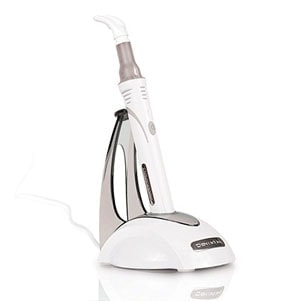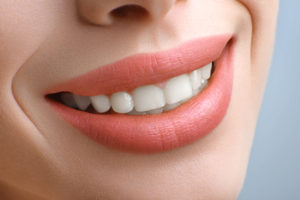Many people experience tooth sensitivity at some point in their lives. Tooth sensitivity can range from a dull pain to a sharp, throbbing sensation. Sensitive teeth can be caused by many different factors, including aging, damage to tooth enamel, tooth decay, and gum disease.
If you avoid cold or hot foods due to extreme tooth sensitivity, it may be a good idea to seek professional advice about this painful condition. Your dentist may be able to recommend a treatment plan that will help alleviate tooth pain. Let’s look at the leading causes of sensitive teeth.
Why are my teeth sensitive all of the sudden?
The leading cause of tooth sensitivity is the wearing down of the tooth’s enamel. The tooth you can see above your gum line, known as the crown, is covered with a protective enamel. Below the gum line is the root of the tooth, which is protected by a material known as cementum. Both enamel and cementum protect a less dense substance known as dentin, which contains small tubes or canals. When the tooth’s enamel starts to wear away, it leaves the dentin exposed and vulnerable. Substances such as hot or cold foods are then able to pass through the canals in the dentin, stimulating the nerves inside the tooth, which can cause extreme tooth sensitivity.
Tooth enamel can decay or wear down over time. Brushing your teeth using a stiff brush or brushing too aggressively can erode tooth enamel. Teeth can also become worn and sensitive due to acidic foods and drinks, which can erode the tooth’s enamel.
While the most common cause of tooth sensitivity is worn enamel, there are many other reasons that teeth may be sensitive. Tooth sensitivity may be due to tooth decay, a broken tooth, or a filling that has become worn or damaged. These problems all expose the tooth’s dentin, which will make your teeth feel very sensitive.
Other causes of extreme tooth sensitivity are gum recession and grinding your teeth at night. The gums can recede with age, leaving your roots exposed. If you grind your teeth at night, eventually, the enamel will begin to wear down and expose the dentin.
Can tooth sensitivity go away?
Sensitive teeth are a common problem, and can occur at any age. Adults over the age of thirty are more likely to have sensitive teeth as their tooth enamel will have aged and started to erode.
It’s unlikely that tooth sensitivity will go away on its own. If your teeth have started to feel sensitive, it’s best to see a dentist and have your oral health checked out. Don’t ignore the problem and hope that it will go away. Your dentist can diagnose the cause of your tooth sensitivity and recommend treatment.
Unfortunately, once your tooth enamel has started to wear down, it won’t grow back. You can help prevent the erosion of tooth enamel by brushing your teeth regularly, flossing, and avoiding acidic foods and drinks. If you suffer from dry mouth, make sure to drink lots of water, as saliva helps wash away acids that can damage tooth enamel. Many dentists recommend using a soft-bristled brush and a toothpaste designed especially for sensitive teeth.
If you’ve recently had dental treatments or surgery, this may cause temporary sensitivity, which will go away once your teeth, gums, and mouth heal. Common procedures that cause temporary tooth sensitivity include crowns, fillings, and bleaching.
Is tooth sensitivity serious?
It’s hard to determine how serious tooth sensitivity is, as many things can cause it. It’s best to seek professional help if your teeth are sensitive. Your dentist can help determine the severity of the condition and recommend the appropriate treatment plan.
How to fix tooth sensitivity
If you’re suffering from extreme tooth sensitivity, see your dentist as soon as possible. In some cases, treatments such as crowns, inlays, or bonding can help protect the teeth and reduce sensitivity. Your dentist may also recommend using fluoride toothpaste or treatment, as these can help to strengthen your tooth’s enamel.
Your dentist can also look for signs of gum disease, as this is a common cause of sensitivity. If gum disease has progressed to advanced stages, you’ll need treatment.
If you feel that your tooth sensitivity isn’t severe, you may want to try treating it at home initially. There are many desensitizing toothpastes on the market that can help protect your teeth. If you’ve been using a desensitizing toothpaste and notice no improvement after two weeks, it may be best to get checked out by your dentist.
Does a sensitive tooth mean root canal problems?
Extreme sensitivity can indicate that there’s a problem with your teeth’s roots. If the roots have become exposed, your mouth will feel sensitive. If the situation is severe, your dentist might recommend a surgical gum graft, which will help cover exposed roots and protect them. If your tooth is extremely sensitive and other treatments don’t help, your dentist may recommend a root canal, in which the nerves are removed entirely.
Does saltwater help sensitive teeth?
Gargling with salt water may give some relief to sensitive teeth, as salt is an antiseptic ingredient. It can also help to reduce inflammation and alleviate pain after dental surgery.
If you suffer from sensitive teeth, you can try gargling with salt water twice a day. Add half a teaspoon of salt to a cup of warm water and rinse this around your mouth, gargling for about thirty seconds.
Find a DentalVibe dentist
Need a dentist? If you’re experiencing any issues with your teeth, including extreme tooth sensitivity, view our directory of certified pain-free DentalVibe dentists today! Your dentist can provide a diagnosis and treatment options to help improve your oral health and your smile.
















